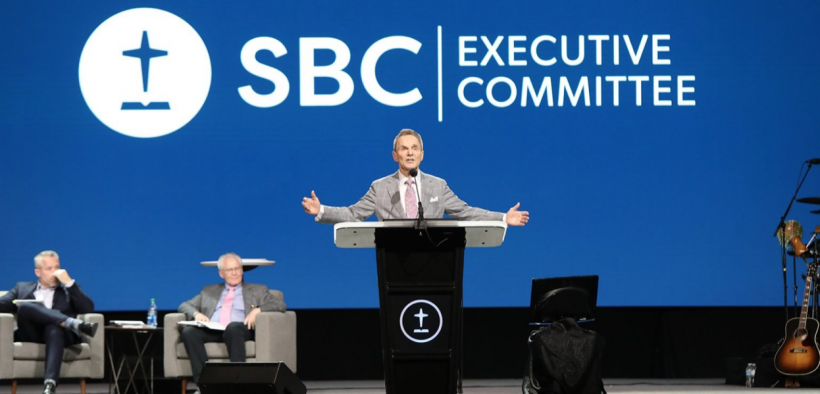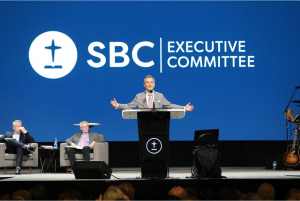Debates on Sex Abuse, Critical Race Theory Front and Center at First Day of SBC Meeting

As Southern Baptists opened their annual meeting, the debates that have rocked the nation’s largest Protestant denomination in recent months almost immediately became part of the business on the crowded convention floor.

To a denomination that has been riven on issues of sex abuse, race, and gender, outgoing President J.D. Greear championed a return to core values, urging fellow Baptists on Tuesday (June 15) to identify with the gospel they preach rather than all the topics on which they may not agree.
“Why do we exist?” he asked in his final presidential address after serving an additional, third year due to the COVID-19 pandemic. “Are we primarily a cultural and political affinity group or do we see our primary calling as being a gospel witness for all peoples in all places at all times?”
As Baptists arrived to choose from at least four candidates who might serve as the next SBC president, leaders urged prayer for the conduct of the meeting and for unity among those gathered. Former SBC President Bryant Wright asked that the time usually used to recognize past presidents instead be used for prayer.
Shortly after the 15,000-plus “messengers,” or delegates, gathered at the Music City Center paused for prayers, people approached the microphones to represent concerns around some of the SBC’s latest controversies, many of which swirled around the denomination’s Executive Committee.
Access to MinistryWatch content is free. However, we hope you will support our work with your prayers and financial gifts. To make a donation, click here.
The day before, that committee rejected a request to broaden an inquiry into its handling of sexual abuse allegations to include all the entities of the SBC and to culminate in a public report. Accusations about mishandling of abuse resurfaced after two letters written by Russell Moore, who had resigned as president of the SBC’s Ethics and Religious Liberty Commission, were leaked to the press in the weeks before the Nashville meeting.
During the Executive Committee’s report at the annual meeting, the messengers voted a second and final time to amend the constitution of the Southern Baptist Convention so it will make explicit that churches that mishandle cases of abuse or racial discrimination are not welcome.
When the committee gave its report Tuesday morning, its request for approval of an amended business and financial plan was soundly rejected.
“I don’t think it is wise to give our Executive Committee additional authority at this time when they are under investigation for their response to sexual abuse and other perceived overreaches,” said a Kentucky messenger.
Others agreed, including Danny Akin, chairman of the SBC’s Council of Seminary Presidents, who said among his concerns were that the plan “would jeopardize our standing with our accrediting agencies.”
Several other messengers made motions related to an inquiry into the committee, which handles SBC business outside the annual meeting. One wanted to prohibit any money from the SBC’s unified budget, or Cooperative Program, to be used for an independent investigation of either the committee or the public policy commission. Others wanted a group of pastors to be involved in an inquiry before an independent investigation takes place.
A Tennessee pastor, with a woman he identified as a sex abuse survivor beside him, asked for a review, paid for by SBC funds, into the mishandling of abuse, mistreatment of survivors, and intimidation of advocates and victims.
In addition to the focus on allegations of leaders thwarting efforts to address abuse, questions arose early in the meeting about critical race theory, an academic theory about systemic racism.
As expected, Tom Ascol, a Florida pastor and president of Founders Ministries, called for the rescinding of Resolution 9, which was adopted at the 2019 meeting and concluded, “Critical race theory and intersectionality should only be employed as analytical tools subordinate to Scripture—not as transcendent ideological frameworks.”
He also requested the Executive Committee budget be “amended to prohibit any funds being allocated to any institution agency or entity that in any way supports, promotes, or advocates any tenets of critical theory, critical race theory, or intersectionality.”
Greer, noting “I am no advocate of CRT,” ruled the motion out of order in part because “it would be impossible to administer this.” Ascol appealed Greear’s ruling, and a vote by show of hands sustained the president’s ruling.
Later in his presidential address, Greear seemed to attempt to put the debate about CRT into context.
“The vast majority of Southern Baptists and of the convention leaders, both Black and white, recognize that CRT is an ideology that arises out of a worldview at odds with the gospel,” he said. “And it is clear that as a convention we need to clarify and strengthen our position on it. But we should heed the counsel of our leaders of color who tell us that our denunciations of justice movements fall on deaf ears when we remain silent on the suffering of our neighbors.”
The messengers passed a resolution, “On the Sufficiency of Scripture for Race and Racial Reconciliation,” which did not specifically refer to critical race theory. Instead it said “we reject any theory or worldview that finds the ultimate identity of human beings in ethnicity or in any other group dynamic” and “we reject any theory or worldview that sees the primary problem of humanity as anything other than sin against God and the ultimate solution as anything other than redemption found only in Christ.”
The resolution, a nonbinding statement that reflects the sentiments of Southern Baptists attending the 2021 meeting, also rejects theories and worldviews that deny racism and reaffirms the apology to African Americans stated in a 1995 resolution that included repentance for systemic racism.
Greear also cautioned about leadership that is a modern-day version of the Pharisees in the Bible.
“It probably looks like insisting on accountability and leadership, while allowing gossip and cynicism and slander to go unchecked,” he said. “It might look like any institution that creates unnecessary obstacles for victims of sexual abuse to seek justice by hiding behind legal smokescreen and NDAs.”
As he concluded his address, Greear strove to have his fellow Baptists look beyond the issues up for debate at the rest of their two-day meeting.
“No, we are not a perfect people, but our gospel, and our Bible that holds that gospel, that is perfect,” he said. “And if we keep these things at the center, eventually, we’re going to become the people that God has called us to be. We might be slow and dull and hard to heart sometimes, but eventually the gospel will get us there.”
Bob Smietana contributed to this report.



